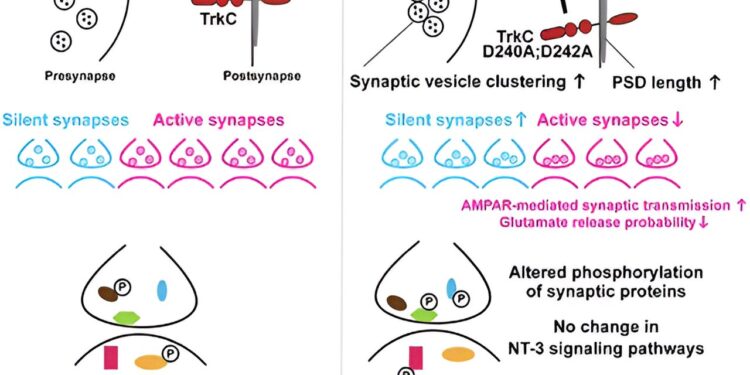Synopsis. Credit: EMBO magazine (2024). DOI: 10.1038/s44318-024-00252-9
Scientists from the University of Montreal and its affiliated Montreal Clinical Research Institute (IRCM) have discovered the unique roles of a protein complex in the structural organization and function of brain cell connectivity, as well as in specific cognitive behaviors.
The work of a team led by Hideto Takahashi, director of the research unit on the development and plasticity of synapses at the IRCM, in collaboration with the team of Steven Connor from York University and that of Masanori Tachikawa from Tokushima University in Japan, are published in EMBO magazine.
Although synapse organization defects are linked to numerous neuropsychiatric pathologies, the mechanisms responsible for this organization are poorly understood. The results of the new study could provide valuable therapeutic information, the researchers believe.
Two goals are important to keep in mind in this research, said Takahashi, research associate professor of medicine in molecular biology and neuroscience at UdeM.
“The first is to discover new molecular mechanisms for communication between brain cells,” he said. “The other is to develop a unique new animal model of anxiety disorders exhibiting panic disorder and agoraphobia-like behaviors, which helps us develop new therapeutic strategies.”
Understanding the mechanisms
Mental illnesses, such as anxiety disorders, autism and schizophrenia, are among the leading health disorders in Canada and around the world. Despite their prevalence, drug development and treatment of many of these diseases has proven very difficult, due to the complexity of the brain.
Scientists have therefore strived to understand the underlying mechanisms that lead to cognitive disorders in order to advance therapeutic strategies.
The junctions between two brain cells (neurons) are called synapses and are essential for the transmission of neuronal signals and brain functions. Defects in excitatory synapses, which activate signal transmission to target neurons, and those in synaptic molecules predispose to many mental illnesses.
Takahashi’s team previously discovered a new protein complex within the synaptic junction, called TrkC-PTPσ, that is found only in excitatory synapses. The genes encoding TrkC (NTRK3) and PTPσ (PTPRS) are associated with anxiety disorders and autism, respectively. However, the mechanisms by which this complex regulates synapse development and contributes to cognitive functions are unknown.
Work in the new study by first author Husam Khaled, a doctoral student in Takahashi’s lab, showed that the TrkC-PTPσ complex regulates the structural and functional maturation of excitatory synapses by regulating phosphorylation, a biochemical modification of proteins, many synaptic synapses. proteins, while disruption of this complex causes specific behavioral defects in mice.
Building Blocks of the Brain
Neurons are the building blocks of the brain and nervous system that are responsible for sending and receiving signals that control brain and body functions. Neighboring neurons communicate via synapses, which act as bridges allowing signals to pass between them.
This process is essential for proper brain function such as learning, memory and cognition. Defects in synapses or their components can disrupt communication between neurons and lead to various brain disorders.
By generating mice with specific genetic mutations that disrupt the TrkC-PTPσ complex, Takahashi’s team discovered the unique functions of this complex. They demonstrated that this complex regulates the phosphorylation of numerous proteins involved in the structure and organization of synapses.
High-resolution imaging of the mutant mouse brains revealed abnormal organization of synapses, and further study of their signaling properties showed an increase in inactive synapses with defects in signal transmission.
By observing the behavior of the mutant mice, the scientists found that they exhibited elevated levels of anxiety, including increased avoidance in unfamiliar conditions and impaired social behaviors.
More information:
Husam Khaled et al, The TrkC-PTPσ complex governs synapse maturation and anxiety avoidance via phosphorylation of synaptic proteins, EMBO magazine (2024). DOI: 10.1038/s44318-024-00252-9
Provided by the University of Montreal
Quote: Research into brain cell connectivity poses potential target for anxiety disorders (October 11, 2024) retrieved October 11, 2024 from
This document is subject to copyright. Except for fair use for private study or research purposes, no part may be reproduced without written permission. The content is provided for informational purposes only.



